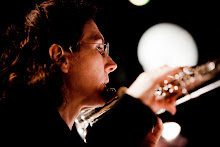 | |
| "Not the damned Waldstein again!" |
OK, that was way simplified. Better informed and better working minds than mine have pondered and written about the evolution of the Second Viennese School. My point is to look at now. The biggest question that I ask myself in my ensemble work as a "contemporary" musician is this: Where is the music?
Schönberg may have been seeking artistic and intellectual integrity in music, but I want to know WTF happened to music itself? Yes, I am peevish and here's why: Music seems the least important aspect to almost every project we do. If it's a theater project, the visual aspect must take precedence (and be sensational, damn the score!). If it is multi media, the technology takes precedence. If it is "purely" musical, it must be set to a theme that draws audience members in, regardless of quality. (How else do pieces like Henri Pousseur's La Seconde Apothéose de Rameau get programmed?)
One benefit of all this is that contemporary classical music is reaching a wider audience. But are we marketing it to death and losing sight of the search for something genuine and meaningful? When I finished my formal musical studies I had a limited number of choices. Contemporary music was one of the least remunerative, but I felt it fit my Geist, somehow. I felt I understood the drive of 20th century composers such as Schönberg and Boulez to find a new language that satisfied both the intellect and the aesthetic. (Not that I put myself on the same level as them!)
 |
| Nice weather we're having, did you enjoy the concert? |
Rewind, look at Schönberg's Vienna. Salons, forced small talk, social, artistic and economic comparison of others in a bourgeois setting. I don't want it. I want the music back.
 | |
| Revolution sucks. Evolution rocks. |


Wow.
ReplyDeleteI don't know the Schönberg history, and don't have a huge curiosity to know what motivated him and his pals to change music. It feels like a musical impulse to me, and the Schönberg pieces I've gotten to know well seem as perfect to me, in a musically expressive way, as any music ever.
More to your point: As a fellow contemporary music performer, I've certainly experienced some of the frustrations of impulse and motivation that you cite, but not to such a degree, or as frequently, as you seem to have experienced them. I wonder how much of that has to do with the fact that you're employed in the context of a full-time ensemble that is supported by the state. Here in the U.S., as you know, such things don't exist, and contemporary music ensembles, such as they are, may be less beholden to the influences you describe. My groups (San Francisco Contemporary Music Players, Earplay, Empyrean Ensemble) struggle for their very existence, and provide only a small fraction of any player's income, but they do get to call their own shots. Not that they aren't driven by a wish to succeed in their markets, and not that this wish doesn't sometimes compromise musical values or impact programming decisions. But there seems to me, potentially, to be an essential difference that may explain some of how these non-musical emphases have developed.
The group therapy thing is intriguing. My wife played in a professional string quartet that did ongoing group therapy, but that was more like long-term marriage counseling.